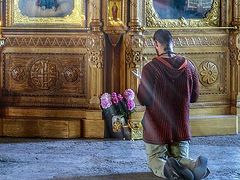The Church has always been and will always remain the little flock in this world, as the Savior said (cf. Lk. 12:32). And, no matter how much we want the opposite, today we live in a period of history when the flock of Christ is exceptionally small and exceptionally scattered: not having completely recovered from the turbulent twentieth century, we have proved to be unprepared for new trials—confusion, ambiguity and contradictions, with which the life of our society and Church is filled in our days. Simon, Simon, behold, Satan hath desired to have you, that he may sift you as wheat (Lk. 22:31). We see these things happen day after day: we are atomized, scattered, and constantly suffer losses.
What is the usual, standard “verdict” of the Church community on yet another priest who has renounced his priesthood, or a monk who has abandoned his vows, or a layman who has left the Church? In a nutshell, it sounds like this: “It is entirely his fault.” To put it mildly. But in most cases the judgment is much harsher and shorter: “Traitor!” And it is hard to argue with this: abandonment of the Church, breaking of vows and disregard for the promises priests give before ordination are bitter, tragic mistakes. And we are ourselves to blame for our errors in one way or another.
In any case, it is the easiest way, to condemn and forget someone and move forward without getting confused at new losses. Or maybe being confused and asking ourselves: what is their cause? And is it possible to avoid them, at least partly if not completely?
The Apostle Paul teaches us: cut off occasion from them which desire occasion (2 Cor. 11:12). He also says that if meat make my brother to offend, I will eat no flesh… lest I make my brother to offend (1 Cor. 8:13). And it seems we ought to think more seriously about this: what occasions do we, Church people, give someone to leave the Church? By what do we tempt those who are weak in faith but still believe in God?
Of course, there have always been and will always be individuals who leave the Church only because they have stumbled on their ego. Among them are those who, according to the old Russian proverb, “sought not Jesus but a piece of bread”, and, convinced that the “piece” is not large and luxurious enough, left in search of it elsewhere. There are also those who initially respond to Christ’s calling easily but soon get interested and engrossed in something else with just as lightly. Finally, there are those who, realizing how resolutely and radically they must be transformed, growing from the old man into the new man, decide this road is not theirs.
However, there is another category of people: they have walked away from the Church because they were disappointed. They were not disillusioned with themselves, or their ideals, or even Christianity as such, but with what they saw in the Church. Again not the Church sacraments, or its saints, or history, but its present human component. Again, we could say: “No one is preventing you! Get along with you! Everything is clear with you and the apostle characterized you rightly about 2000 years ago: They went out from us, but they were not of us (1 Jn. 2:19).” Yes, we can say so… But what if the reason is different? What if they went out of us because we are not what we are supposed to be? I hold that this question should concern us most of all.
“I wish, most beloved brethren, advise and persuade you that no brother should perish if possible,” Hieromartyr Cyprian of Carthage wrote in his book, On Church Unity.
This is precisely what we must wish and wholeheartedly strive for instead of labelling our brothers and sisters in Christ who are lost to the Church, forgetting them at best, making them targets for criticism, denunciation and, ultimately, condemnation at worst.
We must be honest with ourselves, the external circumstances, those who judge us (even if with prejudice), and above all with God. We are very weak Christians, we often build our lives in the Church in such a way that it is extremely hard to recognize disciples of Christ in us, we hardly bear any resemblance to the light which shines before all men (cf. Lk. 11:33) and the salt of the earth (cf. Mt. 5:13) no matter what we may think or speak of ourselves. If we did, people would see this in us and bear witness to this as it was before, when even persecutors had to recognize the uniqueness of the life of Christians in comparison with that of non-Christians. And some would hate us for this, others would persecute us, and others would love us—precisely for this.
Integrity and the cry of repentance (which are inseparably linked), a sincere desire to overcome our weakness and again the cry of repentance when we have made no progress is not only the hope for salvation. It is also a guarantee of the fact that people who come to church today will nevertheless believe us, that everything is genuine and serious here, that there is no falsehood in it, but that there is human weakness and the power of God ,which is in action despite or even against weakness.
It is painful not only to speak but also to think about this. But I believe we shouldn’t be silent about this. Because, I will repeat, there are too many losses and there will be more if we don’t change and if the degree of our integrity and openness doesn’t change, if our reaction to any reproach (even the most deserved and justified one) will be self-justification, which contradicts both reality and common sense, completely forgetting how often we implore the Lord during services, repeating the Psalmist’s prayer: Incline not my heart to any evil thing, to practise wicked works (Ps. 140:4).
The following words belong to the wonderful Church writer, confessor and ascetic of the twentieth century Sergei Iosifovich Fudel (1900—1977). These are golden, precious, bitter words, which contain the key solution for the unsolvable:
“The Holy Church of Christ is one! But its dark double has existed in history near it and under its name.”
And further:
“Evil has always lived next to the never-fading life of the Church of Christ, within the Church enclosure; and we should keep our eyes open to this, keeping in mind that the hand of him that betrayeth Me is with Me on the table (Lk. 22:21). St. John Chrysostom was not afraid of realizing and voicing the spiritual disease of his Local Church. St. John of Kronstadt said: ‘Not knowing the spirit that destroys, you will not know the Spirit that gives life. Only by means of direct contrasts of good and evil, of life and death, can we clearly know both the one and the other.’ 1 And now the Church lives in a time when it is especially important for Christians to have a clear vision so that they can ‘know both the one and the other.’”
And today the Church lives in “such a time” too: Now, “the clear vision of Christians” that makes the recognition of “both the one and the other”—that is, life and death—possible, is more important than in the time of Fudel. It is more important because our era is characterized by the blurring of the boundaries between good and evil, righteousness and vice; there are no obvious apostates, yet there are no obvious saints; everything is drab and dim. And in this gray darkness people are often misled and disoriented. And someone, observing things that should never exist in the Church, gradually gets used to this “fact”, reconciles himself to it and ultimately becomes part of it, its component. And he finds an unshakeable excuse for it: “It can’t be helped, since the that’s the way the Church is now.” And someone else, just looking inside the Church enclosure, gets terrified and runs away, explaining this by the same words but making the opposite conclusions: “It can’t be helped, since that is the way the Church is now.”
Fudel was sincerely convinced that those who are new to the Church need a sort of “vaccination”.
“Some young newcomers to the Church accept everything they see in it rashly and trustingly; and then, when its ‘dark double’ delivers them a blow, they are fatally distressed up to the point of regressing to atheism,” he wrote.
And I would add that today this happens not only to young people but to people of various age groups. Nothing is more painful to us than disappointment, and disappointment with something that’s the most important and is supposed to be the purest and most perfect of all.
The journey to the Church of a person who turns to God consciously and with full awareness of the fact that life is only in Him is usually difficult. On this path are pain, sorrow, and the understanding of the deadlock to which life leads anyone who forgets heaven and thinks only about the earth. Naturally, first he feels this wonderful joy and the fullness of being that has opened up to him in the Church and experiences it very keenly. He perceives the Church as the keeper of the Truth and the concentration of holiness. It is logical that he regards Church people—archpastors, pastors, the lower orders and workers of churches and numerous other Church structures—in the same way, namely as “beings of another realm”. And no wonder, because all these people have made this choice worthy of admiration by devoting their lives to the service of God and the Church.
But some time passes (sometimes a considerable period, sometimes a short one) and he is inevitably faced with the fact that life in the Church is far from ideal. In many aspects it is similar to the life he encounters every day outside the Church, and it can be said that in some respects it is even worse. In the world all of us are used to human lies, hard-heartedness, and venality and consider them as a “norm”; but in the Church… Nothing of this kind should be found in the Church! And the awareness of the fact that “this exists, though it shouldn’t” turns into inexpressible disappointment.
If before all looked beautiful and filled with light in the Church, including its human component, someone who is disappointed sees that everything is “wrong”, noticing defects, incorrectness and vices everywhere. Initially he thought highly of everybody in the Church because each of them is its part, but now he thinks negatively of the Church, having found that some or even many of its members are “not good”. He starts thinking so negatively that he can’t see good in people anymore. He doesn’t see how someone else changes for the better day after day, pursuing the only aim—to become what the Lord wants to see him as. Because by the mercy of God this happens in the Church today, and will happen to the end of time.
We have seen in others (including those whom we call “Church people”) the loss of the ability to see light in the Church; have we ever noticed something like this in ourselves? Yes, of course.
People deal with disillusionment in different ways. Indeed some leave and later become “ideological opponents”. Others remain but become embittered, joining the ranks of the part of the Church community nicknamed “the fifth column”. Others cool down, have a breakdown, and merely exist and don’t live in the Church, feeling neither joy nor the fullness of being anymore.
But we wouldn’t have seen any of this if they hadn’t been charmed by the things they shouldn’t be charmed by in the first place; if they hadn’t been deluded by their misconceptions, if they had undergone the “vaccination” (about the need of which Fudel spoke), if at the moment of their entry into the space of Church life someone else had wisely and prudently explained to them what the Church is like in reality. If he had explained that human weakness doesn’t prevent the Church from remaining holy; how people’ injustice toward each other inside the Church doesn’t annul Divine justice; and how our impurity doesn’t make it impure. And, most importantly, how to walk towards salvation in it when there are too few people around you who seriously care about their salvation; how to keep in mind that there is Christ in it, and you are with Him if you stay in it despite everything and listen to His immortal words, and learn life from Him and with Him.
The whole of the New Testament—the Gospels, the Acts and Epistles of the Apostles, and Revelations—doesn’t promise us an “unclouded Church life”, and doesn’t hint that one and all will be righteous and worthy of imitation; the Holy Scripture bears witness to the opposite. The apocalypse as the end of earthly history is the aftermath of this “opposite”—the apostasy in the Church environment. In that case, however paradoxically it may sound, we shouldn’t grieve excessively when we see inappropriate things in the Church. What really matters is our place in the Church, whether or not we have enough faith, courage, and faithfulness in order to remain what we are called to be—that is, Christ’s disciples, for whom He is still the way, the truth, and the life (Jn. 14:6), and there are no other way, truth and life.
“In the Church, Seek Christ!” the extremely relevant and important testament of Fudel reads. “Seek only Him! Because only the Church is the Body of Christ in its humanity, only His Body; and then you will be given a wise heart for the discernment of good and evil in the Church, in order to see that the light of the Church shineth in darkness; and the darkness comprehended it not (Jn. 1:5).”





